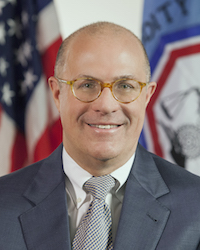Speaking at the Sefcon conference in Midtown Manhattan last week, Commodity Futures Trading Commission Commissioner Christopher Giancarlo set forth an aggressive agenda for his tenure as Acting CFTC Chair, which began on January 20.
Much of what he wishes to accomplish he already has publicized in hisPro-Reform Reconsideration of the Swaps Trading Rules; Return to Dodd-Frankwhitepaper, published in January 2015.
In the first of four initiatives, Giancarlo wishes to replace the CFTC’s current swaps-trading framework with one that would allow market participants to choose the manner of their trade execution that best suits their needs.

- Christopher Giancarlo, CFTC
“My proposed framework will better align regulatory oversight with inherent swaps market dynamics,” said Giancarlo. “Crucially, the alternative fully aligns with Title VII and promotes swaps trading under CFTC regulation. It will help to attract, rather than repel, global capital to U.S. trading markets. Making market reform work for America means addressing the market fragmentation that has arisen as a consequence of the CFTCs flawed swaps trading regime.”
Fixing swap data reporting also is high on the agenda as SDRs cannot give regulators with a comprehensive picture of bank counterparty risk in the global markets, he added.
“Of all the many mandates to emerge from the financial crisis, transparency into swaps counterparty exposure of major financial institutions was perhaps the most pressing,” said Giancarlo. “The failure to accomplish it is certainly the most disappointing.”
From a cross-border harmonization perspective, he plans to address the issues in a way consistent with the G-20 Leaders Statement from the Pittsburgh Summit in 2009.
“Regulators must follow the flexible, outcomes-based approach advocated by the OTC Derivatives Regulators Group for equivalence or substituted compliance,” he said. “We cannot expect to achieve cross-border harmonization if we continue to follow an identical, rule-by-rule substituted compliance analysis.
Giancarlo also wants US regulators to catch up with other national market regulators in promoting new financial technologies like distributed ledger technology.
“The UK’s Financial Conduct Authority has already created an Innovation Hub that allows FinTech firms to introduce innovative financial products and services to the market and test new ideas through its Regulatory Sandbox,” he said. “Unsurprisingly, the FCAs Innovation Hub has received a lot of positive attention and regulators in Australia, Singapore, Japan and other countries are moving forward with their own initiatives. The CFTC and other U.S. financial regulators must come together and look to emulate the UK, Australia, Singapore and Japan to avoid stifling innovation and DLTs potential benefits.”
However, Giancarlo’s eyes may provebigger than his stomach for rest of 2017. When Chair Timothy Massad steps down on Friday, Giancarlo and Commissioner Sharon Bowen will be the only remaining commissioners who can advance his plans, which could prove difficult.
Chair Massad, who gave the opening remarks at the conference, found operating the Commission day-to-day challenging when there were only three commissioners.
The Sunshine Act prevents the majority of Commissioners from discussing policy in private, he said. “Just imagine what we might have accomplished had we been able to talk to one another more.”
The Trump administration likely will fill the three empty seats on the Commission within the next 12 months, according to fellow conference speakers Bill Shields, chief compliance officer at GFI Swaps Exchange, and Mark Wetjen, managing director head of public policy at the Depository Trust & Clearing Corp. as well as former acting Chair of the CFTC and commissioner.
Wetjen cautioned that the newly minted commissioners will need time to acclimate to their new positions before contributing their policy perspectives.



